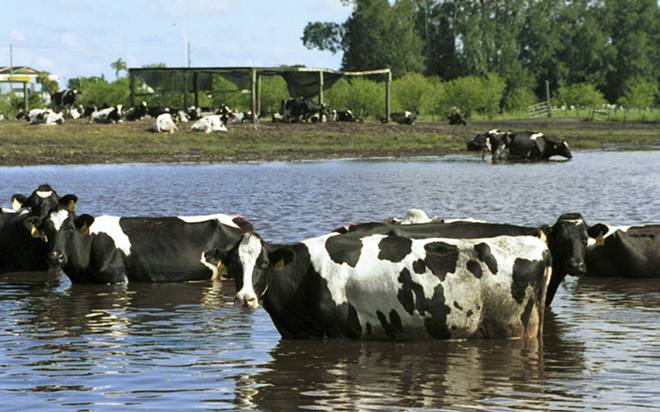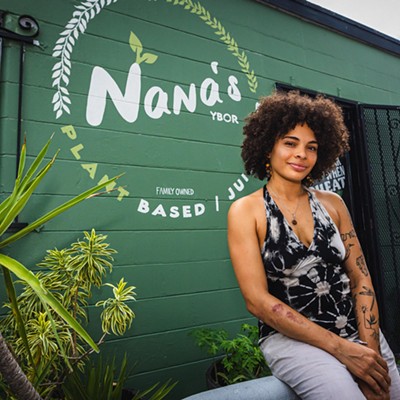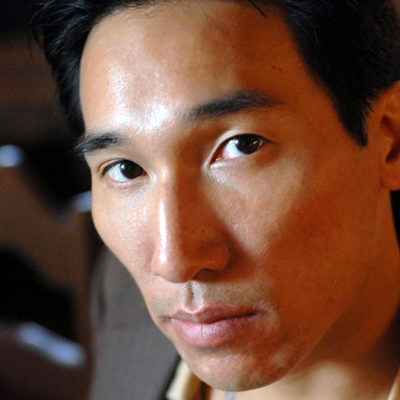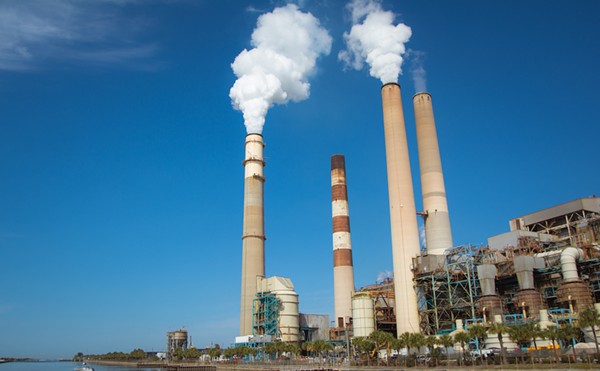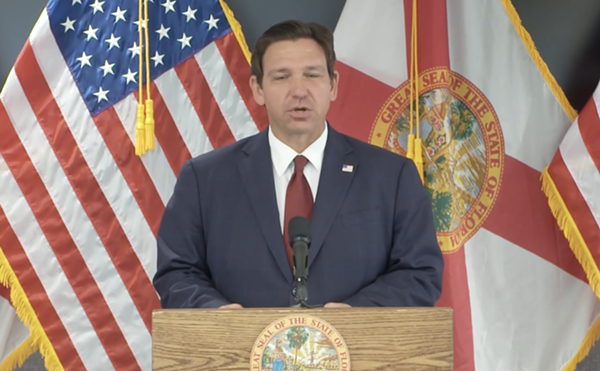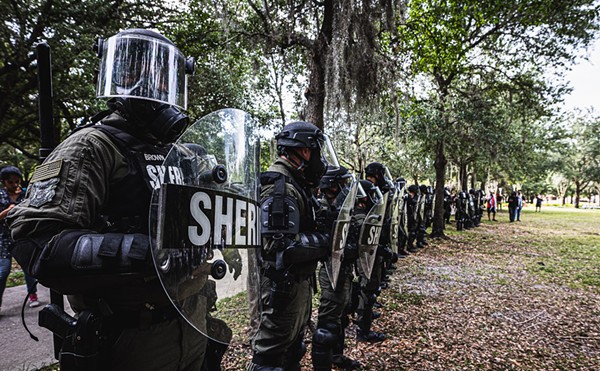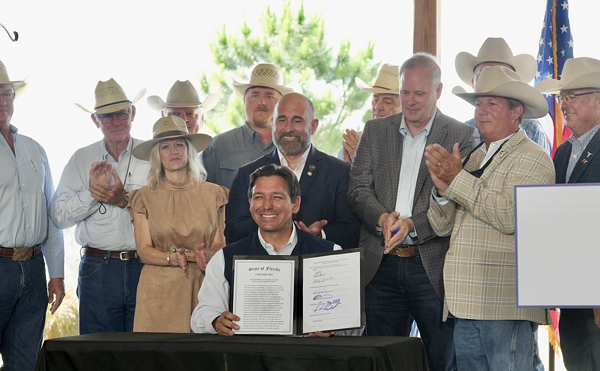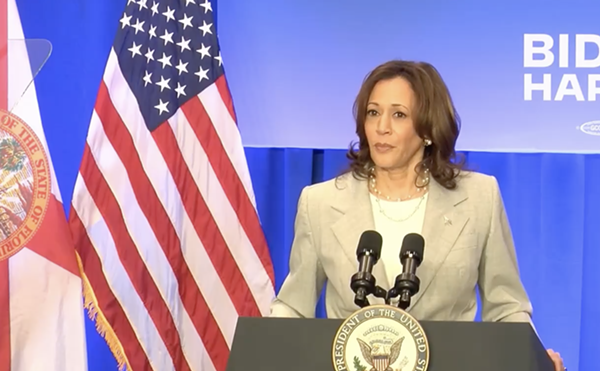The timing is impeccable for Cornell University horticulture professor David Walter Wolfe’s visit to Eckerd College, where he’ll give a public discussion on climate change and its impact on our food supply.
After all, even as sea levels rise and increasingly erratic weather patterns threaten Florida’s food producers, top state officials seem hell-bent on ignoring the phenomenon, if not denying it altogether. Allegations that Governor Rick Scott’s administration warned against using such terms as “climate change” and “sustainability” in official communications appalled environmentalists and made national headlines (and punchlines).
But don’t expect Wolfe, who has offered insights via national outlets like NPR’s All Things Considered, National Geographic and USA Today, to engage in debate over whether climate change is real. We’re well beyond that question, he says, even if Florida’s political leaders wish to pretend otherwise.
Wolfe talked with CL about the looming instability of our food supply and why politics needs to take a back seat to real science.
Your lecture is titled “Climate Change and the Future of Food.” What kind of threat does climate change pose to the food supply?
One kind of take-home message that I want to talk to farmers about is that really, they are the first generation of farmers ever who can’t rely on historical weather records to tell them when to plant, what to plant or how to grow their crops. The climate is changing at a pace that’s at least 50 times faster than the last transition as we came out of the last ice age 20,000 years ago. So farmers can’t look at the calendar to determine when to do something. They can’t look at what their grandfather did or their father did or even what they did last year to guide them in how they grow their crops.
How is climate change affecting Florida farmers, who grow tomatoes, strawberries, citrus and many other crops?
A couple trends that are affecting Florida, most notably, are, of course sea level rise with the coastal system, intrusion of saltwater into some of the waterways, reducing some of the supply of freshwater for agriculture as well as for humans. But at the same time we have a trend where, when it does rain, we’re getting heavy rainfall events. It’s a broadly observed climate change trend we’re seeing. So farmers in this area are dealing with both drying conditions and threats to good fresh water supply and at the same time, in particular, el Niño years where you can have wetter springs, cooler, wetter winters... These weather conditions can delay planting and make it more challenging for farmers to grow some crops.
What’s likely to happen is [a change in] species. Those that prefer cooler temperatures have to keep on basically migrating northward in terms of their range. So there’s a lot of shifting around, as fish species adjust to the changing ocean temperatures. This creates complications for those in the fishing industry.
Our oceans are also absorbing tons of CO2, creating carbonic acid as a byproduct of CO2 and H20. This is causing the oceans to become more acidic. What are the potential hazards of this for Florida?
This creates a huge problem for all of the shellfish species [and coral reefs] because [they] can’t form calcium carbonate. Those reefs aren’t just something that attracts SCUBA divers like myself, but also are important breeding grounds for many fish species.
How is all of this likely to affect consumers, and how can they prepare?
We have to make sure that we have the whole food system working in a way that buffers consumers from price increases or complete shortages in times of weather-related disasters and crises. We have to educate consumers about what they eat, and that their diet affects their carbon footprint and farming. And so if you’re a concerned citizen about reducing greenhouse gas emissions and all of that, you’ve got to be thinking about what you eat and what kind of farmers you’re buying food from.
What are some lifestyle changes people can make to lessen their impact?
Eating local... is certainly one component of playing a role in reducing your carbon footprint. But it has to be eating local in season, obviously. For example, where I’m from in the northeastern US, trying to produce tomatoes in the winter requires a greenhouse and using a lot of energy, so that doesn’t make much sense. Looking at farmers who use more sustainable farming practices makes a lot of sense. And then also the volume of meat in the diet plays a role because... it essentially uses up more energy to produce crops that feed the livestock. So the more we eat our fruits and vegetables, which we should be doing for our health anyway, the more we reduce our meat consumption, the more we’re contributing toward reducing the carbon footprint of agriculture.
Is there a way to reduce our energy use without going to extremes that may be uncomfortable for some Americans?
Our reliance on energy is so pervasive...it can get very wearing and almost impossible to divorce ourselves [from] our reliance on energy...It’s too alluring, and we’re too much of a species interested in some level of comfort. And energy brings us that. So I think we need to think about alternatives to fossil fuels as well as conservation. Support policies and politicians interested in trying to incentivize that shift.
Governor Rick Scott’s administration reportedly directed the Department of Environmental Protection not to use terms like “climate change” and “sea-level rise.” How dangerous are such policies?
What the governor has to say doesn’t change the fact that local homeowners, local communities and local politicians in both parties are having to deal with climate change. Florida is really the poster child of states in the United States in terms of the threats of sea level rise. We have individual homeowners worried about...their stairways down to the beach getting destroyed every time there’s a little bit of a windy system and it’s at high tide. We have city officials in Miami and Key West, high tide streets get flooded routinely now, going back to the taxpayers and saying, ‘We’re going to have to use some of your tax dollars to [deal with] high tide flooding events.'
But that’s the debate we should be having. Not whether we can use the word “climate change”... It’s my opinion that there’s very, very few deniers of climate change. I think the people who come across as deniers, they’re really concerned about is that doing something to slow the impacts of climate change would be bad for business, bad for the economy. I happen to disagree with that opinion, but that’s a very valid public debate we should be having.
Recently, State Rep. John Wood questioned carbon dioxide’s effect on climate change because “God gave us C02 to grow plants, for us to exhale, everything else.” Can you explain, in layman’s terms, why this is ridiculous?
Carbon dioxide has been a component of the atmosphere. That carbon dioxide that the plants pull out of the air for photosynthesis has been balanced by CO2 releases in sort of an evenhanded way. So carbon dioxide in the atmosphere had remained quite steady for years. But our use of fossil fuels [takes] carbon that has not been part of our climate system because it’s been very deep in the earth in these oil deposits. When we take carbon that’s not interfering with our climate system very deep in the earth, we bring that up, then we burn that, now it’s part of our climate system. We’re taking our whole CO2 cycle, that is an actual natural phenomenon, and we’re putting it out of balance.
David W. Wolfe is a Professor of Plant and Soil Ecology in the Department of Horticulture at Cornell University's Atkinson Center for a Sustainable Future.
"Climate Change and the Future of Food" takes place Monday, March 23, 6 p.m., Galbraith Auditorium at Eckerd College at 4200 54th Avenue South in St. Pete.

